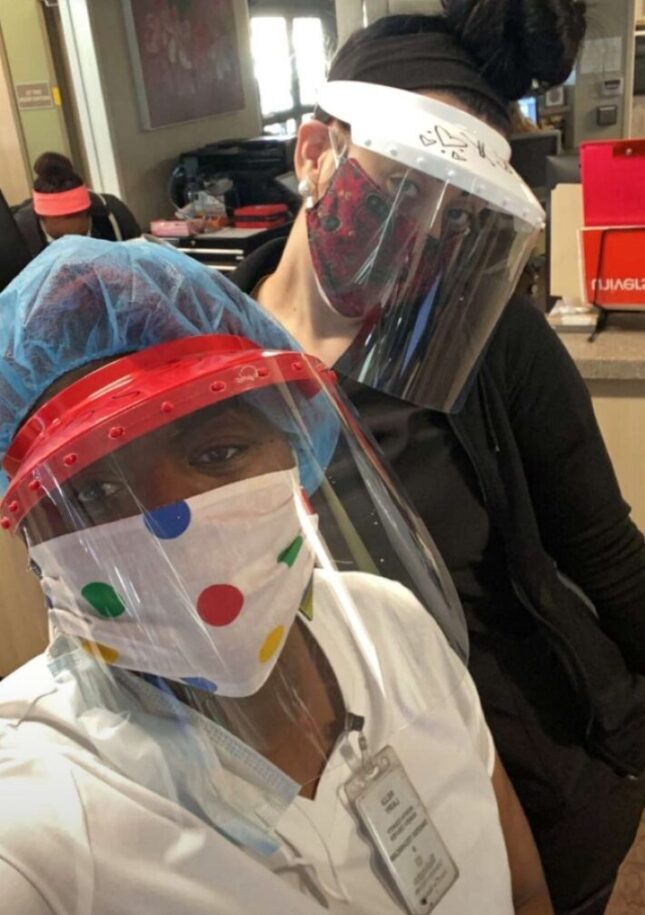
In the polka dot mask is Rejji Lairy (CCHT – certified clinical hemodialysis technician) and Alexandra Thebeau (CCHT). They represent the “Love and Style” of in-center hemodialysis at North County Dialysis Center, according to nurse manager of North County Dialysis Center, Tom Gowen.
New Routines

Tom Gowen, RN, nurse manager, North County Dialysis Center
“I can hear the staff on the floor laughing and joking today … so it is a good day!” says Tom Gowen, RN, nurse manager of Washington University’s North County Dialysis Center, when asked how the dialysis unit was adapting to the COVID-19 crisis. While it cannot be overstated how much has changed in the daily routine of our North County, Chromalloy and Forest Part dialysis centers, Gowen says “We are doing well.”
In the beginning, patients were a little frightened, admits Teresa Tamburello, RN, nurse administrator at Chromalloy Dialysis Center. “There was that fear of the unknown. But spirits are a better now … we have a routine. Change is always hard, even if they are good changes, and these are good changes. Settling into a new routine makes it feel more like a comfort zone.”
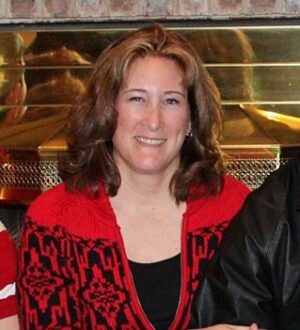
Teresa Tamburello, RN, nurse administrator, Chromalloy Dialysis Center
To prepare for a possible influx of COVID-19 positive patients, WashU Nephrology, early in the crisis, put new protocols into place in the centers to protect both our patients and the staff who take care of them. One protocol that was deemed critical was to screen patients as soon as they entered the dialysis unit. It was imperative to recognize those with fever or respiratory infection, determine their exposure to the virus, identify those who were positive, and arrange for their placement in the units as needed. While the units now take care of the screening themselves, thanks go out to staff from the Division of Dermatology and the Division of Cardiology who initially helped with the screening procedure. “The screeners were wonderful for the time they were here!” says Gowen. The division succeeded in developing screening and reporting tools to monitor the status of our patients via the EPIC medical electronic system (see more here). When identified, symptomatic patients were isolated from other patients, and if a center had more than one COVID-19 positive patient, those patients were grouped on the same shift for dialysis.
More than Dialysis
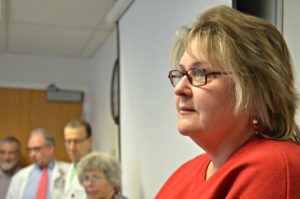
Jamie Miles, Administrative Coordinator, Forest Park Kidney Center
The staff’s responsibility does not begin and end with dialysis. Jamie Miles, administrative coordinator at our Forest Park Kidney Center, has been vital in securing transportation for their COVID-positive patients who do not have family or friends to take them to their dialysis session. “I have been here at WashU dialysis for 14 years now,” she says. “I’ve become very close with my patients and they know they can come to me for anything. Whether it be transportation related or if they just need a shoulder to cry on.” Jamie says that many of her patients do not have anyone to advocate for them, therefore she feels she is their eyes and ears and will keep them safe and healthy to the best of her ability.
“My hat is off to George Jarad, MD, and Patty Anderson, RN, nurse administrator at Forest Park Dialysis Center, for keeping us cool, calm and safe during this pandemic,” says Miles. “Without them we would not be fairing as well as we are. They are the backbone of this center and we owe it all to them for making everything run as smoothly as it does! I know this has not been easy on any of us emotionally or physically, but we are all #Nephstrong and we will win this battle. We will survive this as a team, which is exactly what we are!!!

Patty Anderson, nurse administrator at our Forest Park Kidney Center
Anderson remembers the changes they went through at the dialysis unit from when there was just talk about the threat of COVID-19 to when COVID-19 became a reality for them at Forest Park. “Initially the screening process was pretty minimal. The patients would have their temperature taken by our secretary Tiarra Steward when they came into the lobby. She would ask them to put a mask on, and that was it.” It was on March 19th, however, that sitting in their conference room with Dr. Jarad, reviewing our COVID-19 plan with the dialysis staff, that Anderson realized things were going to change. “Dr. Jarad said we needed to step up our screening process. He told me we would have to lock the front door and not let anyone in without a mask on. All I could think of was how upset the patients were going to be with us for changing their routine. However, that was not the case. The patients were very grateful for us taking the extra step to keep them protected from the virus. They adapted to the change quite well.”
Education is also important in the centers. The staff keeps patients updated about how to protect themselves with instructions on hand and respiratory hygiene, how to dispose of contaminated items, and how to use facemasks or tissues to cover nose and mouth when coughing or sneezing. “We try to make sure staff and patients have a mask to take home,” says Gowen. “Several employees have brought in face masks sewn by their friends or mothers. We also give patients hand sanitizer and alcohol pads to wipe down their phones and belongings while they are here.”
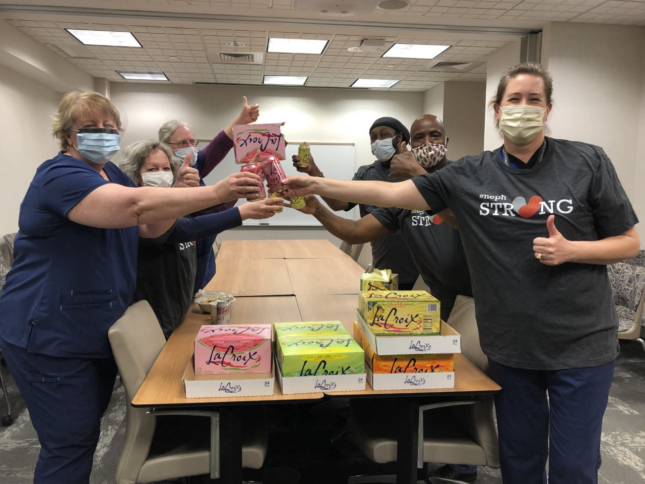
Dialysis staff at Chromalloy Dialysis Center. Dr. Victoria Fraser, chief, Department of Medicine, hand delivered cases of LaCroix water to WashU Nephrology dialysis staff, faculty and fellows. A huge thank you goes to National Beverage Corporation for the donation!
A New Normal
“Chromalloy is holding up as well!” says Tamburello. “The staff has been doing a phenomenal job taking care of our patients, and the patients put their trust in the staff. They see the staff doing their job with confidence and calmness. They turn to us for that security. There is a sense of trust in the center.”
Tamburello is proud of the job they are doing. “I can’t commend our staff enough. We don’t stand out like the more high-profile front-liners like the EMTs, ICU and ER personnel, but we are here on the front line, too, working very long hours, doing our jobs and doing them well! It is what we do. We call it the new normal.”
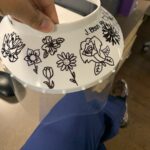
Decorated face shield
Anderson stresses that members of the staff themselves have done a great job in settling into this new normal. “I know they were all worried about having to take care of the COVID-19 positive patients when this all started, but having all of the PPE we need has helped to alleviate that fear. It has taken all of us at the center working together to implement the changes and making these changes a daily routine. Thanks go out to everyone I work with for going the extra mile to make sure our staff and patients feel safe at the WashU dialysis units.”
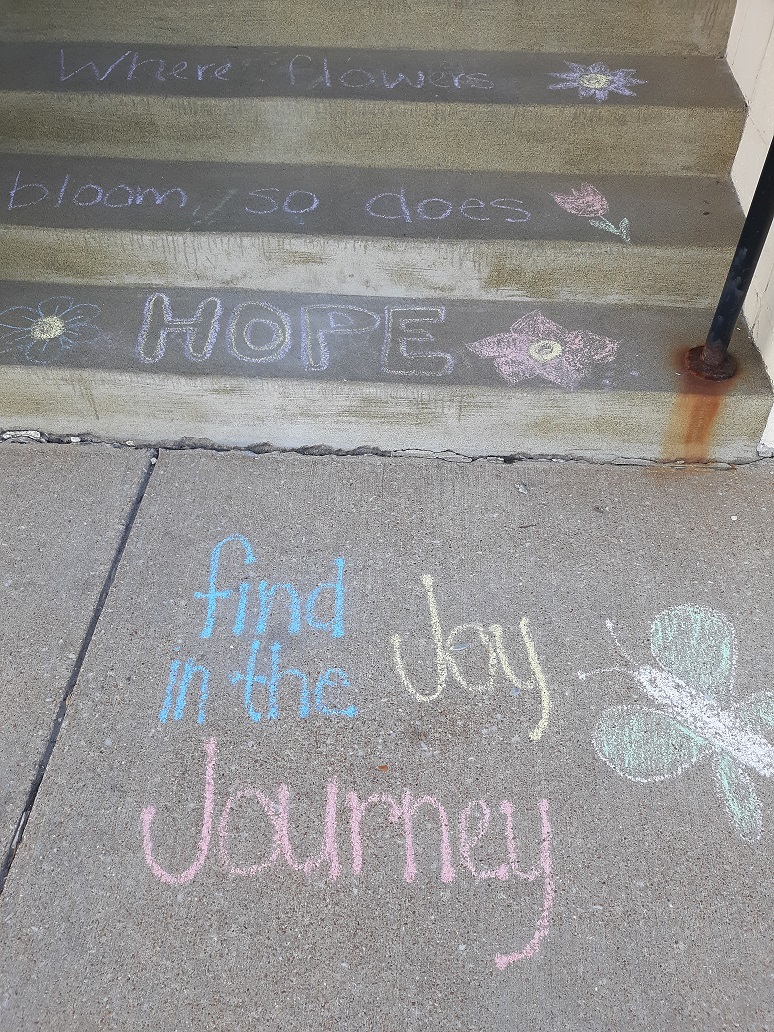
Stairs leading into North County Dialysis Center; decorated by RN Jess Bean.
Trying to Make Every Day a Good Day
All in all, the centers are adapting.
“We are all feeling the stress of the unknown,” says Gowen, “but we are putting into action everything we can think of to mitigate the potential effect of the pandemic. We communicate daily with patients and staff, checking for symptoms, and working to make sure the patients have the smallest amount of disruption as possible.”
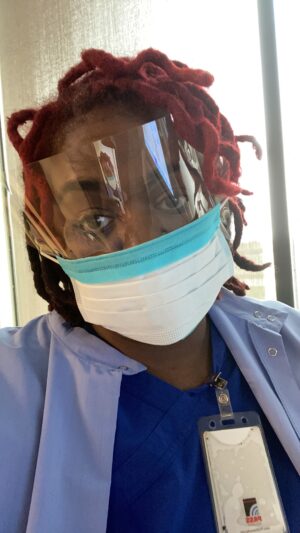
Jess Bean, RN, at North County Dialysis Center
Gowen also works hard at trying to keep the atmosphere in the North County center upbeat. “We try to have a song every day – one day it was ‘Working at the Car Wash’ – to help with the early morning wipe down.”
And that might just help make a day a good day!
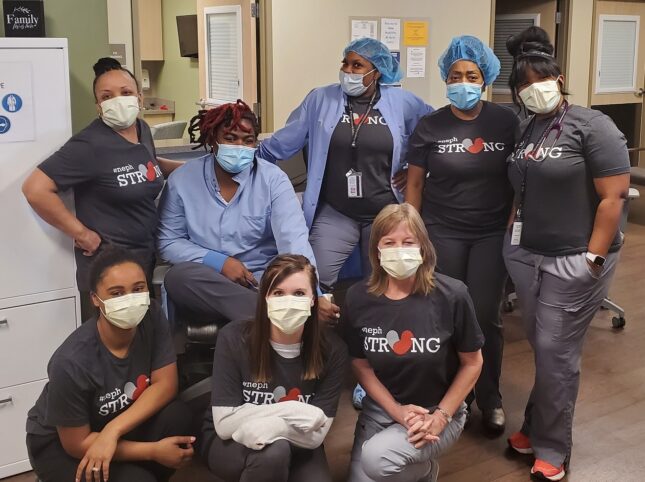
COVID-19 Team at North County Dialysis Center. Front row; Jess Bean, Chala Walsh, and Deb Murphy. Back row: Carmalita Flemons, Rejji Lairy, Sherrith Scarbrough, Gena Hubbard, and Maranda Watts.